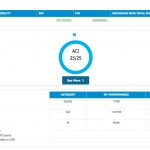Additionally, the ACR team expects that participation in a qualified registry like RISE will allow rheumatologists to earn credit in the Clinical Practice Improvement component of MIPS and possibly other components, as well.
Rheumatology-Specific Quality Measures
With future payments so closely tied to quality and performance measures, the ACR is also working hard to ensure CMS quality measures accurately reflect the patients we treat and the medicine we practice. The ACR has dedicated significant time and energy to developing quality measures that are specific to rheumatology. You will not find these measures in any other registry, and we are actively working with CMS to ensure these and other rheumatology-specific measures are included in MIPS.
Conclusion
Ultimately, the benefits of RISE are vast. Using RISE means convenience, quality and access to valued data and information. Taken together, this means better, more efficient care and more predictable payments in the future. We urge all ACR members to sign up* for RISE and reap the full benefits. In this way, together we can Advance Rheumatology!
 Joan M. Von Feldt, MD, MSEd, FACR, FACP, is president of the ACR and a professor of medicine at the Perelman School of Medicine at the University of Pennsylvania. She is also staff physician at the Philadelphia VA Medical Center.
Joan M. Von Feldt, MD, MSEd, FACR, FACP, is president of the ACR and a professor of medicine at the Perelman School of Medicine at the University of Pennsylvania. She is also staff physician at the Philadelphia VA Medical Center.
Author’s note: *Signing up to participate in RISE can be accomplished by completing a form on the ACR website at or emailing staff directly at [email protected].

